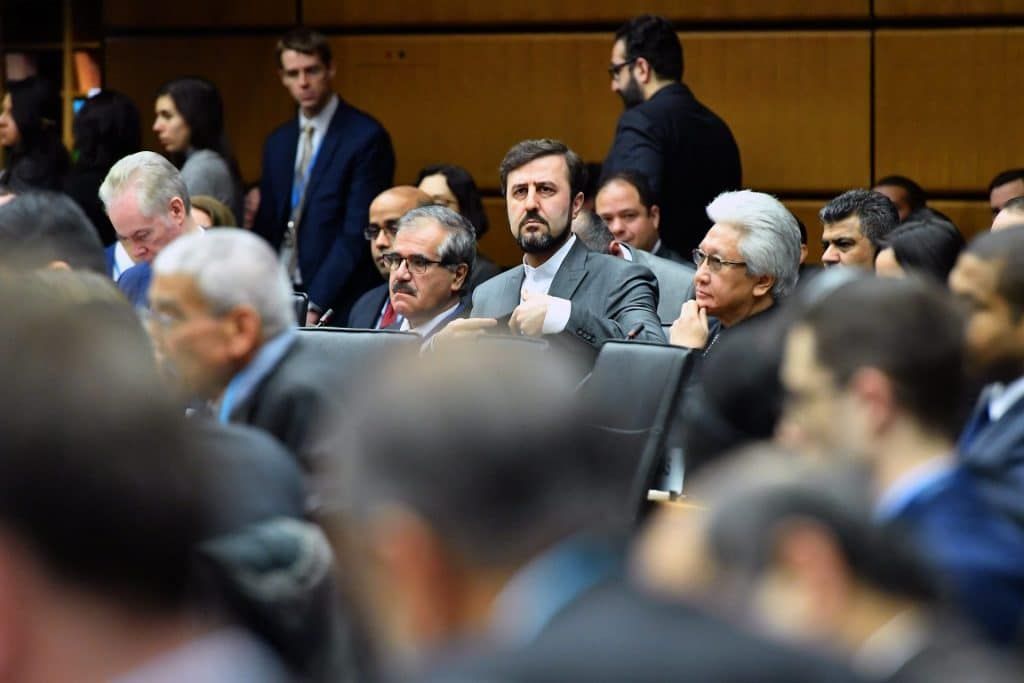One potential victim of coronavirus? Nuclear inspections in Iran
By George M. Moore | March 17, 2020
 Iran’s representative to the IAEA, Kazem Gharib Abadi, during the agency’s Board of Governors meeting, March 2020. Photo Credit: Dean Calma / IAEA
Iran’s representative to the IAEA, Kazem Gharib Abadi, during the agency’s Board of Governors meeting, March 2020. Photo Credit: Dean Calma / IAEA
The health and humanitarian crisis of the Covid-19 outbreak has now been declared a pandemic by the World Health Organization. In attempting to control the spread of the virus, the world community is responding with extraordinary measures, including travel bans. On March 11, the United States announced that it was banning entry for foreigners coming from a group of European countries, alongside similar restrictions already in place for travelers coming from China. Many other countries, too, have established similar travel bans and restrictions, either for valid health concerns or in retaliation for bans against their own citizens.
Stock markets and economies around the world have been severely impacted, but there may be another victim of the pandemic: the 2015 Joint Comprehensive Plan of Action—colloquially known as the Iran nuclear deal—and the enforcement of the International Atomic Energy Agency (IAEA) safeguards regime in Iran.
In Iran, the virus is widespread, affecting even senior government officials. Those who have tested positive for coronavirus include Vice President Eshaq Jahangiri, Minister of Culture Ali Asghar Mounesan, and Minister of Industry Reza Rahmani. Moreover, the virus has already claimed the lives of senior politicians such as Hossein Sheikholeslam, the country’s former top ambassador to Syria, and Mohammad Mirmohammadi, a confidant of the supreme leader and member of the Expediency Council. As covered extensively by the media, even Iranian health officials have appeared on camera displaying flu-like symptoms. The US Centers for Disease Control and Prevention has designated Iran as a Level 3 country, meaning that all nonessential travel to Iran is suspended, as it is for China and the whole of the European Schengen zone.
Iran itself, however, has not yet banned entry from foreigners. This is important because there is a cadre of professionals whose travel to Iran remains very much essential. The inspectors of the International Atomic Energy Agency (IAEA) are mandated to inspect various enrichment and centrifuge development sites throughout Iran under the terms of the nuclear agreement, in addition to normal safeguards inspections under the Nuclear Non-Proliferation Treaty. Should the new IAEA Director General Rafael Grossi decide to suspend inspection visits to protect the health of his inspectors, it could metastasize concerns about Iranian nuclear proliferation. The same result would occur if Iran acted unilaterally to bar inspectors based on real or manufactured concerns about further spread of Covid-19.
To date, there is no public information about whether the IAEA will continue to send inspectors to Iran under the terms of the nuclear deal. Suspending inspections, even temporarily, could potentially leave a multi-month gap that Iran could exploit if it chose to fully break out of the nuclear agreement. In early March, the IAEA reported that Iran had amassed over 1,000 kilograms of low-enriched uranium, nearly triple the amount allowed under the deal. Following this announcement, updated estimates of Iran’s breakout time—the amount of time needed to amass enough fissile material to produce one nuclear weapon—ranged from approximately four to six months. These estimates depend on assumptions about the type of design Iran might be capable of initially using. Implosion systems require less fissile material than gun-type designs. Whatever the exact breakout time might be, most estimates fall within a timespan that health officials seem to indicate might be the duration of the Covid-19 threat.
Whether Iran would attempt to use the cover of Covid-19 to begin a dash for a nuclear weapon is uncertain. However, the loss of “eyes on the ground” in the form of IAEA inspections would probably heighten the worst fears about Iranian proliferation and possibly worsen already dim prospects for cooperation. Even before the coronavirus breakout, Iran had expanded its production of enriched uranium, probably in an attempt to exert pressure and improve its negotiating leverage following the Trump administration’s withdrawal from the deal and its reimposition of sanctions in 2018.
A second and related danger is that, absent the IAEA inspections, there is a greater possibility of miscalculation regarding Iran and its nuclear potential and intentions. Without hard data, US policy makers could begin to fear the worst and assume that Iran was dashing toward a bomb, and it would be difficult to prove otherwise. Other nations, both Iran’s neighbors in the Middle East and other global powers, might also react in unexpected ways, based on insufficient information and fear that Iran was breaking out to produce a nuclear weapon. In any event, lack of information generally leads to instability and whenever nuclear weapons, or the threat of nuclear weapons, is involved, instability could be exceedingly dangerous.
What could, or should, Director General Grossi and the IAEA member states do about this situation to mitigate any potential risks? First, it is essential that any hazards to the health of IAEA inspectors be minimized. The agency must pre-screen its inspectors before they travel to identify those at heightened risk. In addition, inspectors should be equipped to deal with potential contact with the virus by using proper disposable clothing and disinfecting procedures. Inspectors should also be accompanied by medical personnel and should strive to be self-sufficient with food and housing. It is also possible that enhanced technical oversight systems could be installed to temporarily decrease or eliminate the need for inspectors. Although the IAEA has apparently used remote surveillance systems in Iran, the effectiveness of those systems in a situation where inspectors cannot enter Iran will need to be evaluated, and new or upgraded systems may be needed. Such installations would need to be installed by the IAEA in order to be considered reliable, and that would involve the same risks to those personnel as to inspectors in dealing with the virus.
IAEA member states should fully support such efforts so that inspections can continue. Though it might require extraordinary efforts by the IAEA and its board of governors, it is in the world’s interest to have the nuclear watchdog continue its verification programs in Iran despite whatever level of hazard the Covid-19 outbreak presents. Failure to do so could have dire consequences.
Together, we make the world safer.
The Bulletin elevates expert voices above the noise. But as an independent nonprofit organization, our operations depend on the support of readers like you. Help us continue to deliver quality journalism that holds leaders accountable. Your support of our work at any level is important. In return, we promise our coverage will be understandable, influential, vigilant, solution-oriented, and fair-minded. Together we can make a difference.
Keywords: COVID-19, Coronavirus, IAEA, Iran nuclear deal, JCPOA, nuclear inspections
Topics: Nuclear Risk















If the United States stepped up with WHO and other international partners to suspend sanctions and enhance aid affecting medical supplies and other needs of Iranians to deal with the virus, it could go a long way to conveying to the Iranian people that people of the US care about them. It is not just the IAEA inspectors whose actions can impact Iran’s nuclear activities.